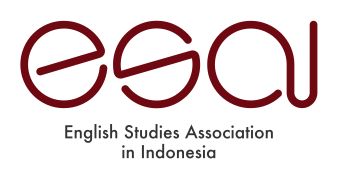Directive Speech Act Seen on Family 2.0 Drama Script Written by Walter Wykes
Abstract
The research entitled Directive Speech Act Seen on Family 2.0 Drama Script Written by Walter Wykes purposes to describe and uncover the types of form and intended meaning of directive speech act on that drama script. This descriptive research uses pragmatic approach and theory. The collecting and analysing data are focused on the using of declarative, imperative, and interrogative sentences in the text of drama. The forms of those sentences will be analysed to find out the types of form of directive speech act, while the context of those sentences will be used to analyze the intended meaning of directive speech act uttered by speakers. The results of the research are found that, first, there are two types of the form of directive speech acts, direct directive speech acts and indirect directive speech acts. Direct directive speech acts are represented by imperative sentence without subject; imperative sentence with let; and negative imperative sentence. Meanwhile the indirect directive speech acts are represented by declarative sentence statement; declarative sentence if clause; negative declarative sentences; and interrogative sentences. Second, the intended meanings seen on drama script of Family 2.0 are command, prohibition, request, treat, and persuasion. It can be concluded that, the most frequent intended meaning appeared in directive speech acts on this script is command by the use of imperative forms. Then, the declarative and interrogative forms are used to request something by adults charaters; in contrast the kids characters use them to command and prohibit the hearer.
Keywords: family 2.0, pragmatic, speech act, directive, form and intended meaningFull Text:
PDFReferences
Downing, A., & Locke, P. (1992). A university course in English grammar. United Kingdom: Prentice Hall International.
Kesuma, T. M. J. (2007). Pengantar (Metode) penelitian Bahasa. Yogyakarta: Carasvatibooks.
Nadar, F.X. (2006). Penolakan dalam bahasa Inggris dan bahasa Indonesia (Kajian pragmatik tentang realisasi strategi kesantunan berbahasa) (doctoral thesis). Gadjah Mada University, Yogyakarta, Indonesia.
Nadar, F.X. (2009). Pragmatik dan penelitian pragmatik. Yogyakarta: Graha Ilmu.
Quirk, R., Greenbaum, S., Leech, G. N., & Svartvik, J. (1973). A grammar of contemporary English. Harlow: Longman.
Ramlan. (2005). Sintaksis. Yogyakarta: C.V. Karyono.
Wijana, I. D. P. (2003). KARTUN: Studi tentang permainan bahasa. Yogyakarta: Ombak.
Wijana, I. D. P. (2008). Tindak tutur dan perwarakan dalam cerpen "Harga seorang perempuan" karya Oka Rusmini. SINTESIS, 6(1), 50-65.
Wijana, I. D. P., & Rohmadi, M. (2009). Analisis wacana pragmatik: Kajian teori dan analisis. Yogyakarta: Yuma Pusaka.
Yule, G. (1996). Pragmatics. Oxford: Oxford University Press.
DOI: http://dx.doi.org/10.30813/jelc.v8i2.1095
Refbacks
- There are currently no refbacks.



2.jpg)



